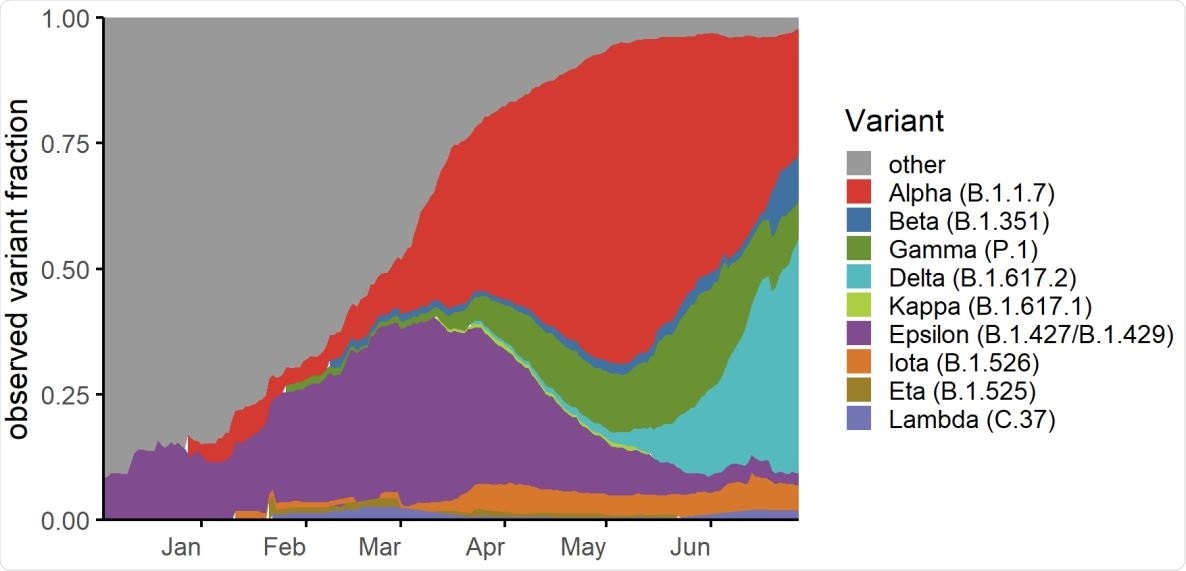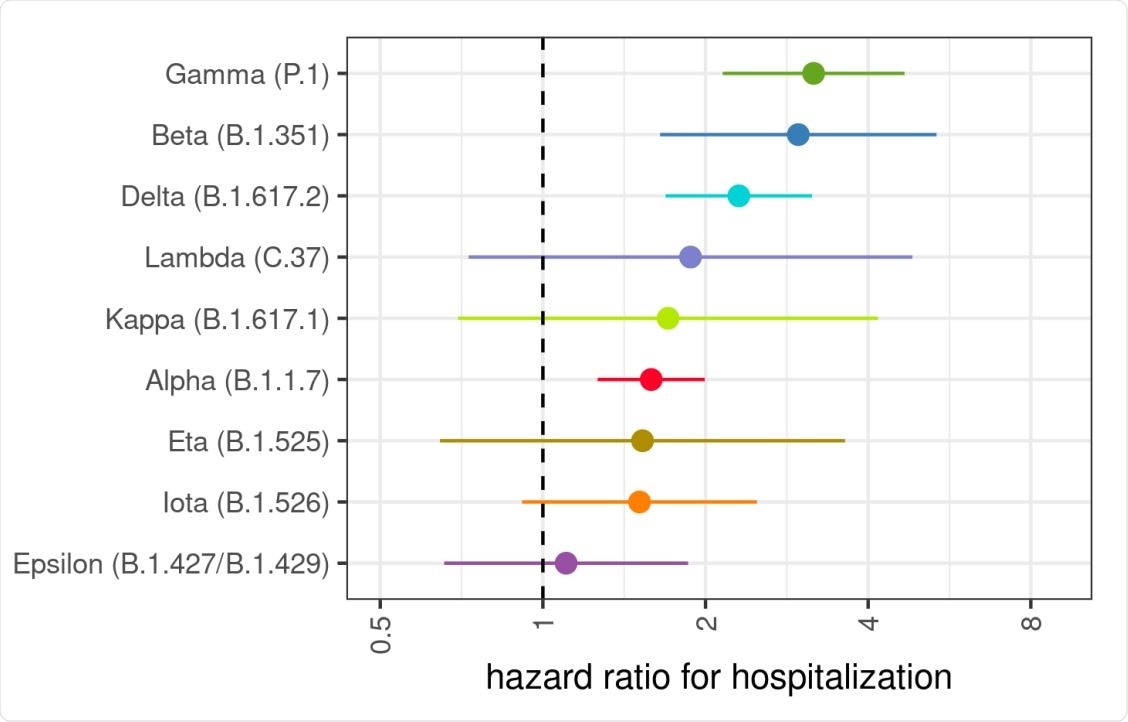
A team of scientists from the USA has recently examined the risk of hospitalization in patients infected with more deadly variants of severe acute respiratory syndrome coronavirus 2 (SARS-CoV-2).
The findings reveal that patients infected with alpha, beta, gamma, and delta variants have a higher risk of hospitalization than those infected with the original viral strain that emerged in Wuhan, China, in late December 2019. The study is currently available on the medRxiv* preprint server while awaiting peer review.

Background
The coronavirus disease 2019 (COVID-19) pandemic caused by SARS-CoV-2 has placed a significant burden on mankind, with more than 234 million infections and 4.8 million deaths recorded worldwide. Moreover, with the emergence of more deadly viral variants, many countries across the globe have experienced second, third, and fourth waves of the pandemic with higher infection and mortality rates.
Given the significantly increased infectivity, transmissibility, pathogenicity, and immune escape ability, some of the novel variants have been designated as Variants of Concern (VOCs) or Variants of Interest (VOIs) by the World Health Organization.
Soon after emergence, each of these VOCs (alpha, beta, gamma, and delta variants) have gained global dominance by gradually replacing previously circulating variants. For example, in Washington State, the delta variant is associated with 70% of COVID-19 cases identified between June and July 2021.
In the current study, the scientists have analyzed COVID-19 cases caused by nine different VOC/VOIs in Washington State to determine the risk of hospitalization associated with these variants.
Study design
The study was conducted on laboratory-confirmed COVID-19 patients in Washington State for whom the viral genomic sequencing data is available. Overall, the study considered cases identified between December 2020 and July 2021.
A total of nine viral variants (alpha, beta, gamma, delta, kappa, Iota, epsilon, eta, and lambda) were included in the analysis to determine the risk of variant-specific hospitalization.
Important observations
A total of 23,170 cases with available viral genome sequencing data were analyzed in the study. The sequencing analysis revealed that non-VOCs/VOIs were dominantly circulating in Washington State at the beginning of the pandemic. However, by March 2021, the major VOCs/VOIs gained dominance by replacing the previously circulating variants.
Among all VOC-infected COVID-19 cases, 38.4% were associated with the alpha variant, 1% with the beta variant, 8.8% with the gamma variant, and 8.7% with the delta variant. Among all VOI-infected cases, 16% were associated with the epsilon variant, and 3% were with other tested VOIs. Apart from VOC/VOI cases, about 24% of enrolled cases were associated with the original SARS-CoV-2 strain.
Regarding demographics, about 91% of enrolled cases were under the age of 60 years, and 94% were unvaccinated.
Risk of hospitalization
A total of 726 hospitalized cases were identified in the analysis (3.1%). Among these cases, 247 were with alpha infection, 12 with beta infection, 127 with gamma infection, and 74 with delta infection. The highest risk of hospitalization was observed for gamma infections, followed by beta, delta, and alpha infections. Other tested variants did not show any significant impact on the risk of hospitalization.

Vaccination status and risk of hospitalization
A separate set of analyses was conducted in the study to compare the risk of hospitalization among variant-specific COVID-19 cases stratified by the vaccination status.
The analysis considering only unvaccinated cases revealed that compared to patients with original SARS-CoV-2 infections, the gamma-infected patients have the highest risk of hospitalization, followed by delta- and alpha-infected patients.
In contrast, no significant impact of VOCs on the risk of hospitalization was observed in the analysis that considered only vaccinated cases. In a separate analysis considering all COVID-19 cases irrespective of viral variants, it was observed that vaccinated patients have a comparatively lower risk of hospitalization than unvaccinated patients.

Study significance
The study indicates that patients infected with SARS-CoV-2 VOCs have a higher risk of hospitalization. However, the risk can be reduced by COVID-19 vaccination. These findings highlight the need for hospital preparedness and mass vaccination in controlling COVID-19 related morbidity and mortality.
*Important Notice
medRxiv publishes preliminary scientific reports that are not peer-reviewed and, therefore, should not be regarded as conclusive, guide clinical practice/health-related behavior, or treated as established information.
- Paredes MI. 2021. Associations between SARS-CoV-2 variants and risk of COVID-19 hospitalization among confirmed cases in Washington State: a retrospective cohort study. MedRxiv. https://www.medrxiv.org/content/10.1101/2021.09.29.21264272v1
Posted in: Medical Research News | Disease/Infection News
Tags: Coronavirus, Coronavirus Disease COVID-19, Genome, Genomic, Genomic Sequencing, Hospital, Laboratory, Mortality, Pandemic, Respiratory, SARS, SARS-CoV-2, Severe Acute Respiratory, Severe Acute Respiratory Syndrome, Syndrome

Written by
Dr. Sanchari Sinha Dutta
Dr. Sanchari Sinha Dutta is a science communicator who believes in spreading the power of science in every corner of the world. She has a Bachelor of Science (B.Sc.) degree and a Master's of Science (M.Sc.) in biology and human physiology. Following her Master's degree, Sanchari went on to study a Ph.D. in human physiology. She has authored more than 10 original research articles, all of which have been published in world renowned international journals.
Source: Read Full Article